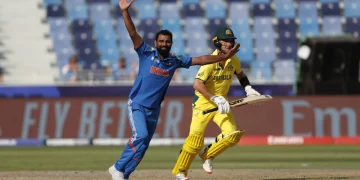As the ICC Champions Trophy approaches, South Africa’s Sports Minister Gayton McKenzie has publicly urged the national cricket team to boycott their upcoming match against Afghanistan.
This call for action comes amid growing concerns over the Taliban’s oppressive policies towards women, particularly in sports, and has sparked a heated debate about the role of sports in advocating for human rights.
A Moral Stand Against Oppression
McKenzie expressed his “moral obligation” to support a boycott, emphasizing that it would be hypocritical to ignore the injustices faced by women in Afghanistan.
“It is not for me as the sports minister to make the final decision on whether South Africa should honor cricketing fixtures against Afghanistan.
If it were my decision, then it certainly would not happen,” he stated.
His comments resonate deeply, especially considering South Africa’s own history of apartheid, where access to sports was denied based on race.
McKenzie believes that turning a blind eye to the current situation in Afghanistan would contradict the values of equality and justice that many fought for during South Africa’s struggle against apartheid.
The Context of the Call for Boycott
The Proteas are scheduled to face Afghanistan on February 21 in Karachi, Pakistan, but the match has become a focal point for discussions about women’s rights and international sporting ethics.
McKenzie’s stance aligns with calls from more than 160 UK politicians, including former MP Lord Peter Hain, who have urged England to also forfeit their match against Afghanistan on February 26.
The Taliban government has disbanded the national women’s cricket team and banned women from participating in sports altogether since regaining power in August 2021.
This has led to widespread condemnation from human rights advocates and has prompted calls for action from various quarters within the international community.
Criticism of the International Cricket Council (ICC)
In his statements, McKenzie also criticized the International Cricket Council (ICC) for its perceived hypocrisy in handling political interference in sports.
He pointed out that while Sri Lanka Cricket was suspended due to government interference, similar actions have not been taken against Afghanistan.
“This suggests that political interference in the administration of sport is being tolerated there,” he remarked.
As discussions continue about whether South Africa should proceed with its match against Afghanistan, McKenzie emphasized that Cricket South Africa and other federations must consider the message they wish to send globally, particularly regarding women’s rights in sports.
The Path Forward: A Collective Approach
While Cricket South Africa (CSA) has acknowledged receiving requests to boycott the match, they have stated that decisions regarding participation should be guided by the ICC.
CSA President Rihan Richards mentioned that a unified approach among ICC members could lead to more impactful change regarding women’s cricket in Afghanistan.
As pressure mounts on both South Africa and England to take a stand, the question remains: will these nations prioritize human rights over sporting commitments?
The outcome of these discussions could set a precedent for how international sports organizations respond to issues of gender equality and human rights violations.
The Role of Sports in Advocacy
As the date of the Champions Trophy match approaches, it is clear that this issue transcends cricket; it touches upon fundamental human rights and moral responsibility.
The debate surrounding a potential boycott highlights the growing recognition that sports can serve as a platform for advocating social change.
With voices like McKenzie’s leading the charge, there is hope that athletes and governing bodies will take a firm stand against oppression and support their counterparts struggling for equality worldwide.
As this situation unfolds, all eyes will be on South Africa and its response to this critical moral dilemma.













